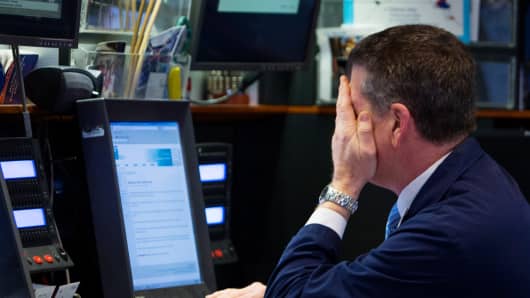Shares of American Electric Power and NextEra Energy plunged more than 50 percent in the first seconds of trading on the New York Stock Exchange on Thursday, the latest in a flurry of unexplained sharp drops in the market.
The NYSE said all transactions in those shares in the first minute of trading will stand. However, the exchange said all trades in AEP at or below $46.03 in that period, and all trades in NextEra at or below $76.19, will be marked with an "aberrant report indicator."
"They're saying it's erroneous, but they want it to stand. I guess they don't want them to be on the charts," said Joe Saluzzi, co-manager of trading at Themis Trading in Chatham, N.J.
NextEra's chief financial officer criticized the NYSE for the brief but sharp drop in its share price at the opening.
"This is naturally a concern for all our shareholders and potential shareholders," said Moray Dewhurst, vice chairman and CFO of NextEra. "This type of market behavior is not what we would expect from a well-functioning and well-regulated exchange."
The drops were the latest such incidents for the market since the May 6, 2010, "flash crash," a computer-driven trading glitch that caused a sudden afternoon tumble in the major U.S. indexes. Last week, the NYSE canceled trades in Anadarko Petroleum after a blip in trading cut the market value of the company by 99 percent.
On Thursday, shares of AEP dropped as much as 54 percent, while NextEra sank 62 percent, both hitting their lowest price of the day right at the opening. Spokespeople for both AEP and NextEra said they had been in contact with the NYSE to determine what had occurred, but had no further comments.
The Standard & Poor's utility index, which contains both AEP and NextEra, led declines on the S&P 500.
Stock moves of 10 percent or more in a five-minute period usually trigger a trading halt, based on Securities and Exchange Commission rules, but the rules do not apply to the first 15 minutes of trading or the last 30 minutes of a session. The exchanges are able to cancel trades in the event of irregular or erroneous activity.
The SEC has approved a program called "limit up/limit down" on all major stock exchanges to reduce volatility of stock trades, but it is just starting to be introduced on large-cap stocks.
Hundreds of trades occurred in AEP and NextEra shares in the first minute of trading, though many were small volume, such as 100 or 200 shares. AEP's stock hit a low of $22.28, but ended down modestly at $48.28. NextEra hit a low of $30.37 before recovering to close at $78.22, down 1.2 percent.
"Essentially you have a market that's unprotected for the first 15 minutes of the day and the last half hour," Saluzzi said, though he noted that the newer rules should help prevent that problem from happening in the future.
The limitup/limit down program aims to halt the trading of U.S.-listed stocks if they moved outside a recently traded price range.
"Limitup/limit down was effective April 8, (but) there is a further rollout period by ticker in alphabetical order," Credit Suisse analysts wrote in a recent research note. "So while a stock may be part of the S&P 500, it may not enter the pilot until a few weeks into the rollout."
_By Reuters


